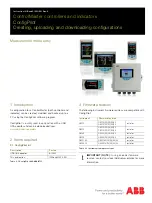
Hardware
8
SLAU802 – March 2019
Copyright © 2019, Texas Instruments Incorporated
MSP430FR2476 LaunchPad™ Development Kit (LP
‑
MSP430FR2476)
2.2.3
Debug Probe Connection: Isolation Jumper Block
The isolation jumper block at jumper J101 lets you connect or disconnect signals that cross from the eZ-
FET domain into the MSP430FR2476 target domain. This includes eZ-FET Spy-Bi-Wire signals,
application UART signals, and 3.3-V and 5-V power.
Reasons to open these connections:
•
To remove any and all influence from the eZ-FET debug probe for high accuracy target power
measurements
•
To control 3-V and 5-V power flow between the eZ-FET and target domains
•
To expose the target MCU pins for uses other than onboard debugging and application UART
communication
•
To expose the programming and UART interface of the eZ-FET to use it for devices other than the
onboard MCU
•
To select the CR2032 battery holder as the 3-V source
Table 2. Isolation Block Connections
Jumper
Description
GND
Ground
5V
5-V VBUS from USB
3V3
3.3-V rail, derived from VBUS in the eZ-FET domain or 3V rail derived from CR2032 battery
RXD <<
Backchannel UART: The target FR2476 receives data through this signal. The arrows indicate the direction of the
signal.
TXD >>
Backchannel UART: The target FR2476 sends data through this signal. The arrows indicate the direction of the
signal.
SBW RST
Spy-Bi-Wire debug: SBWTDIO data signal. This pin also functions as the RST signal (active low).
SBW TST
Spy-Bi-Wire debug: SBWTCK clock signal. This pin also functions as the TST signal.









































